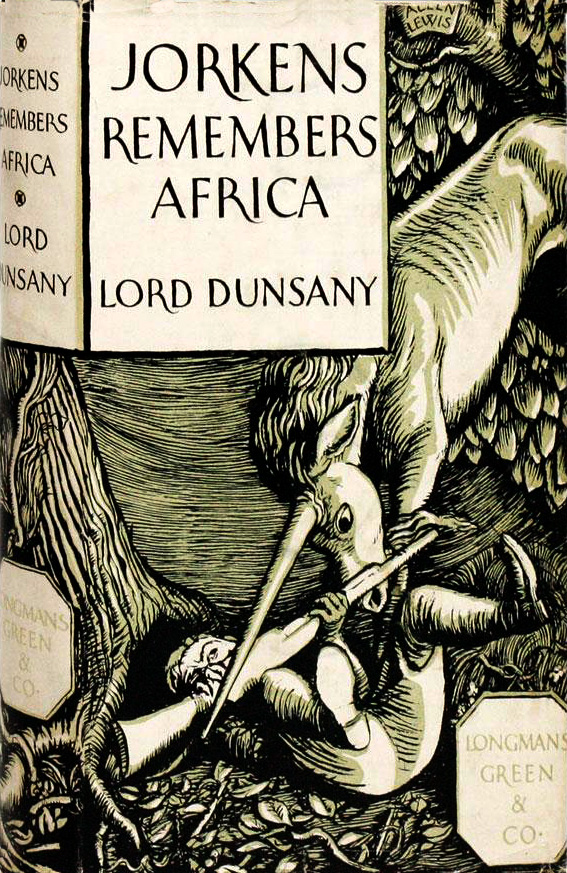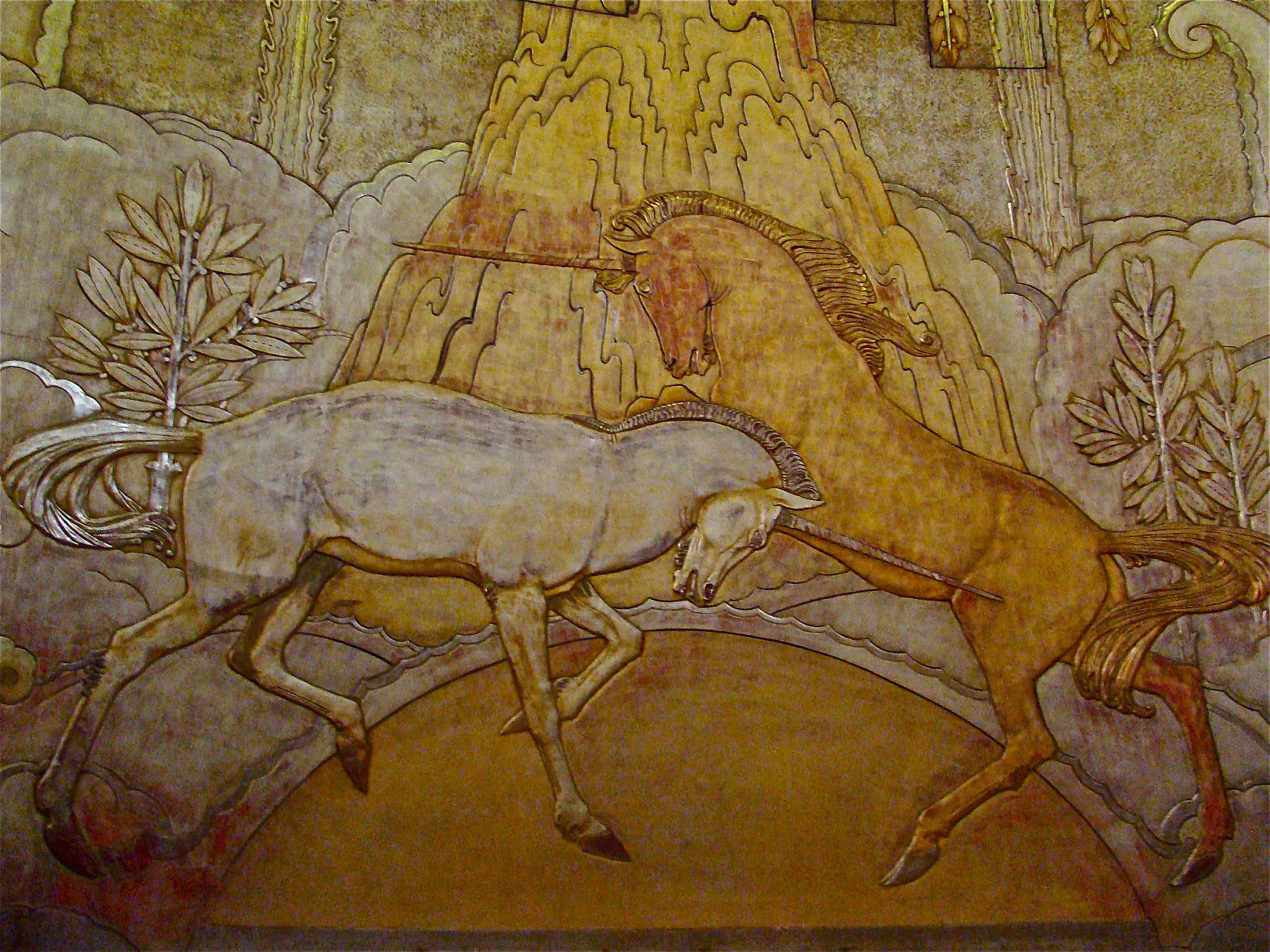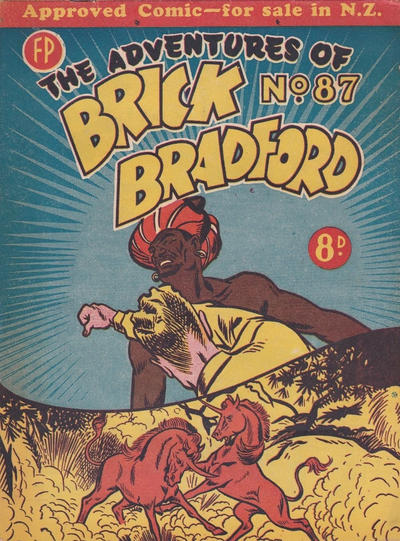Les aventures de Jorkens furent écrites durant les années trente par Lord Dunsany, également auteur de La fille du roi des elfes dont il sera question plus loin.
Membre d’un club anglais, le héros, Jorkens, est toujours celui qui raconte les histoires les plus extraordinaires, à défaut d’être les plus crédibles. Il a bien sûr chassé la licorne en Afrique du Sud, l’une des deux régions, l’autre étant le Tibet, où l’on pensait à la fin du XIXe siècle qu’il pouvait y avoir des licornes.. Malheureusement, ce texte n’a pas, à ma connaissance, été traduit, et je vous le livre donc en anglais.

To say that amongst all those that have read any of the tales of Mr. Jorkens’ travels that I have recorded, none have felt any doubts of any of them would be absurd: such doubts have been felt and even expressed. But what has impressed me very considerably is the fair-minded attitude taken up by the general public, an attitude that may be summarized as a firm determination not to disbelieve a man’s story merely because it is unusual, but to await the final verdict of science, when science shall have arrived at the point at which it is able to pronounce on such matters with certainty. Then, should the verdict be against Jorkens, and not till then, will a sporting public turn upon him that scornful disbelief that they are far too fair-minded to show without good and sufficient proofs. I myself meanwhile am careful to record nothing he tells me, against which anyone in the Billiards Club or elsewhere has been able to bring any proof that would definitely rule it out in a court of law. And it would be interesting to see for how long in such a court arguments that may be lightly advanced now, against the exact truth of any one of his tales, would stand up against the ridicule of counsel. But the sporting attitude that the public have adopted towards him is more to Jorkens than a verdict in any court of law. Curiously enough it is in the Billiards Club itself, the source of all these stories, that the most unsporting attitude is often shown to Jorkens. For instance only the other day one of our members was unnecessarily rude to him, though with only a single word. I need hardly say it was Terbut. The word was not in itself a rude one, but was somehow all the more insidious for that. Also it was really a single word, and not a short sentence, as is often the case when a writer says to you “I will tell it to you in one word.” But I will tell the story.

Photo Andrea James, Wikimedia Commons
We were discussing billiards, which is not a thing we often do in the Billiards Club. There is, I suppose, some sort of feeling that, if anyone talks of billiards there, his imagination or his experience can provide him with nothing better; billiards being, as it were, bed-rock in the Billiards Club. In just the same way at the Athenæum, although the bird is inseparable from the Club’s presiding goddess, one seldom if ever orders an owl for one’s lunch. But we were discussing billiards to-day, and debating whether bonzoline balls or the old ivory kind were the better. I will not record the discussion, for it has nothing to do with Jorkens, but it may interest my readers to hear that it was held at the Billiards Club that the bonzoline ball was unique among modern substitutes, in being better than the old genuine article. It was as we had decided that, that some young member who ought to have known better, seeing Jorkens near him as he looked up, suddenly blurted out: “Have you ever seen a unicorn, Jorkens?” Of course it was not the way to speak to an elder man. Of course the implication was obvious. And Jorkens saw in a moment that the young fellow did not believe in the existence of unicorns at all. In any case he had not yet passed that time of life in which one believes nothing that the ages have handed down to us until we have been able to test it for ourselves. “I deprecate that hard and fast line between fabulous animals and those that you all chance to have seen,” said Jorkens. “What does it amount to, practically, but a line drawn round Regent’s Park? That’s all it is really. Everything inside that line is an animal you readily believe in. Everything outside it is fabulous. It means you believe in an animal if you have seen it in the Zoo, otherwise not. However full history is of accounts of the unicorn, and the most detailed descriptions, still you go off to Regent’s Park on a Sunday, and if there is not one there waiting for your bun you disbelieve in the unicorn. Oh well, I was like that myself till I saw one.”

“You saw one?” said the young fellow who had started the topic. “I’ll tell you,” said Jorkens. “I was camped once by the Northern Guaso Nyero, or rather I was camped two hundred and fifty yards from it, a distance that just makes all the difference, for two hundred yards is all that the mosquito flies from his home. Of course he has a good many homes, that’s the trouble; but, as he prefers a river frontage, it’s a very good thing to camp that far from a river. Not that it amounts to much, for Africa can always get you some other way. But there it was. Well, I was collecting heads for a museum, and had been at it for some time, with a white hunter and eighty natives, trekking through Africa; and I was beginning to get pretty tired of it. I was sitting by one of our campfires after supper, with the white hunter beside me, and I was gazing into the glow of the smouldering logs and watching the fireflies gliding backwards and forwards, and thinking all the while of the lights of London. And the more the fireflies slowly grew into multitudes, and the more the fire glowed, the more I longed for London. In that mood I asked the hunter what we should do next day; and, whatever he suggested going after, I pointed out I had shot it already. Which was perfectly true. “And winds came out of the forest, or over the plains, and softly played with the smoke going up from our logs of cedar, and the visions changed and changed in the glow of the fire, and every now and then the hunter past, that’s what it is now; and not to take account of that is an error as great as supposing a rhino can’t smell. The moment the unicorn sees the line of beaters, with the flanks coming quietly in on him, he knows what’s up; he knows he’s being driven. By a glance at the line (and his sight is very acute) he knows to what direction. He immediately slips through the forest in exactly the opposite; straight through the line of beaters; and in these forests he usually gets through without even being seen by a native. Not that they haven’t seen them.’ “‘Then the place for a gun to stand,’ I said. “‘Exactly,’ he interrupted. ‘Stand in front of the unicorn, wherever he is, and we’ll try to drive him away from you. He’s sure to come straight back.’ “Now this seemed to me perfectly sound. Unicorns do avoid men, there can be no doubt of that. They must have some method in doing it. Granting a considerable intelligence, without which no method is any good, what better than hiding in a dense forest, and, when driven, always going in the opposite direction to that which is obviously intended? And history is too full of the unicorn for us to suppose that they are merely not there. “‘Well,’ said Rhino, for Rhino Parks was his name there, whatever it may have been in England once, ‘those Wakamba trackers have found him. What about trying to-morrow?’ “‘I’m not sure that I can hold a rifle just yet,’ I said. “‘No use giving in to malaria here,’ he answered, ‘or no one would ever do anything.’ “Which is true, though the place is a good deal written up as a health-resort. “‘All right. To-morrow,’ I said. “And to-morrow came, which was one thing to the good. You never know what’s coming, with malaria. “Well I was up and ready by five, but Rhino wouldn’t start till I’d had a good breakfast. So I sat down to it. It had to be liquid, because I could have no more eaten bacon and eggs, as I was just then, than I could have eaten a live squirrel. But we made a breakfast of sorts on two bottles of vermouth that we had; and by about seven we started. “And now comes the incredible part of my story: we crossed the river and pushed into the forest, and I took up my place where the Wakambas told me in whispers, and the beaters moved off away from me, and all the while I had forgotten to load my rifle. You may not believe me; and, if you don’t, I don’t wonder; but there it was, I did it. Malaria, I suppose. As a matter of fact it is just one of those things that people do do once in their lives, and very often of course it happens to be the last thing they ever do. Well, I stood there with my rifle empty, waiting for the unicorn, a .360 magazine: the magazine holds five cartridges and there should be another one in the barrel: and the steps of the beaters sounded further and further away from me. And then there came a broken furtive sound, as of something heavy but sly coming down through the forest. And there I was, with my empty rifle ready. And all of a sudden I saw a great shoulder so graceful, so silken and gleaming white, nearby in that denseness of greenery, that I knew that it must be the unicorn. Of course I’d seen hundreds of pictures of them, and the thing that I marvelled at most was that the beast, or all I could see of him, was so surprisingly like to the pictures. I put up my rifle and took a good enough aim, and then Click, and I knew it was empty. “Of course I hadn’t forgotten to bring any cartridges at all, I wasn’t so crazy as that, whatever my temperature was: my pocket was full of them. I put my hand to my pocket and slipped in a cartridge at once, and there I was loaded, with the unicorn still only twenty-five yards away. But he had heard the click, and, whether or not he knew what it was, he at any rate knew it for man, even if he hadn’t yet seen me; and he changed at once his slow slinking glide for a sharp trot through the forest. Again in a gap I saw a flash of his whiteness, and I fired and am sure I hit him, and then he came for me. Where I hit him I never knew, my one good chance of a shot behind the shoulder was gone, and I had had to take whatever shot I could get; and now I was again unloaded, for there had been no time to put anything into the magazine, and the unicorn was practically on top of me. Even as I took another cartridge out of my pocket he made a lunge at me with his flashing horn, a deadly weapon of ivory. I parried it with my rifle, and only barely parried, for the strength of its neck was enormous. It wasn’t a thing that you could waft aside as you can with the thrust of a sword, if only you are in time; it was so gigantic a thrust that it took all one’s strength to turn it. And you had to be just as quick as when trying to parry a rapier; even quicker. At once he lunged again, and again I parried: no question of thinking of trying to load my rifle; there was only just time for the parry. And as I barely parried, and the horn slipped by under my left arm, through the brown shirt I was wearing, clean as a bullet, I knew that I should parry few more, if any, like that; and that with the next thrust, or the one after, all would be over; for the power I felt in that horn was clearly more than my match. So I stepped back to gain an instant; which I barely did, so swiftly the huge beast stepped forward; and then I swung my rifle over my back and, before he thrust again, I brought it down as hard as I could at his head. I knew it for my last chance, and put into it all the strength that malaria had left me. Now it was his turn to parry. He saw it coming and flicked at it with his horn, and the horn caught it and the two blows came together. Either of them was a good blow. And together they amounted to pretty much of a smash. Well, neither ivory nor steel is unbreakable; and as for the stock of my rifle I don’t know where it went; the branches all round were full of flying splinters. And then I saw that long thin murderous horn, lying white on the ground beside me. The unicorn saw it too: it put its forefeet out, and lowered its nose and sniffed at it. As the beast was doing nothing at the moment, I picked the horn up. And when it saw the horn in my hand it looked irresolutely at me. For a moment we stood like that. It might easily have overcome me by sheer weight, and trampled me under with its pointed hooves; and yet it stood there motionless, seeming to have an awe for its own horn, which it now saw turned against it. Then I moved the horn into the hand that was holding the rifle, with the intention of seeing if it was possible to get a cartridge into what was left of the breech; and at the movement of the horn in my hand the unicorn shied like a horse, then turned round and kicked out with his heels and sprang away, and was almost immediately lost to sight in the forest. And that was the last I ever saw of a unicorn.”

Le paysage aurait plutôt l’air africain, mais les visages et les costumes font indien. En tout cas, c’est exotique.
“But the horn,” said the young fellow who had asked at first about unicorns. “Why didn’t you keep the horn?” “Waiter,” said Jorkens without a word to his critic, “bring me that toasting fork that I gave to the Club.” We most of us present something to the Club, and sure enough Jorkens had once given an ivory-handled toasting fork, that lay in a drawer in the pantry; for whoever wants to use a toasting fork in a Club? And now the waiter brought it, a fork with silver prongs, or electro-plate, and a long ivory handle, too narrow for the tusk of an elephant and too long for a tooth. “And bring me,” he said, “a small whiskey and soda.” The whiskey was brought, and as he drank it the strange fork was handed round. Not all of us had seen it before; none of us had eyed it attentively. “Well, what do you make of it?” said Jorkens when he had finished his whiskey. It was then that Terbut leaned over to me and whispered, but only too audibly, the one word “Bonzoline.” The ungenerous comment cast over the tale something like, well, a miasma. And that’s the kind of thing that Jorkens has to put up with.
Lord Dunsany, Jorkens remembers Africa, 1934
